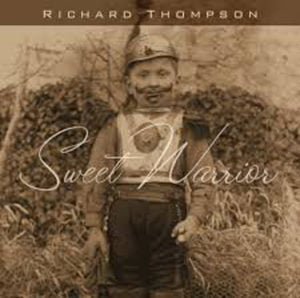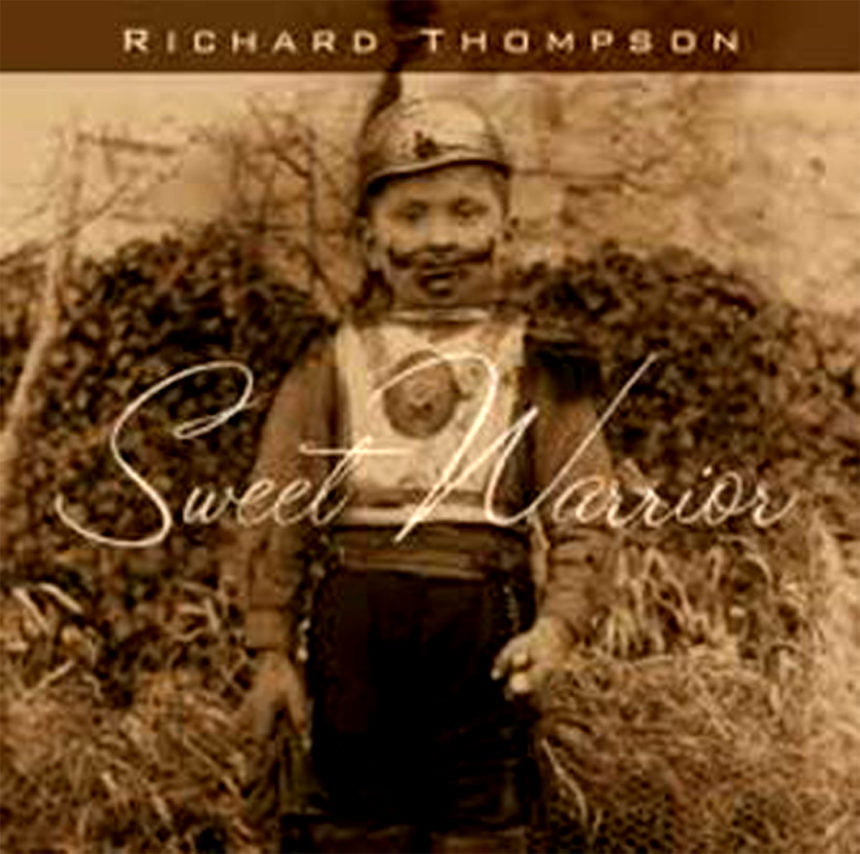
Richard Thompson can transport you to places in his songs like no-one else. Drawing his inspiration from folk songs, oral tales, tattered history books, half remembered stories, bizarre websites and advertising catalogues, Thompson is a master of time and space. Many of his best songs place you in a specific historical context, then move you somewhere else by subtle shifting of words. This is a trick Dylan has used in his most recent albums on a number of occasions, but Thompson has been doing it since his earliest days. The gloriously vicious ‘twisted nursery rhyme’ The Sun Never Shines On The Poor, for instance, from his 1973 album Hokey Pokey, is set an apparently Dickensian world full of street urchins, Salvation Army bands. You can almost expect Fagin or Scrooge to come creeping around the corner until we hear that …the last penny falls through a hole in your jeans… the word ‘jeans’ suddenly catapulting us forward a century. Similarly the 1940s style-ballad Al Bowwly’s In Heaven (1986), which purports to be a nostalgic song about World War Two, was one of the most subtle and damning indictments of the heartlessness of Thatcher’s ignoble reign. Thus Thompson’s songs identifiy elements of the past in the present, and vice versa, thus creating a body of work in which disparate elements history, time and place are continually invoked as metaphors for our current condition.
A lot of what makes this work is Thompson’s own all-exclusive musicality and his genius as a musical arranger. At barely twenty years old he was the main conceptual force behind the Unhalfbricking and Liege And Lief albums, which revolutionised the relationship between Britain’s folk tradition and rock and roll. Now he regularly presents the Thousand Years Of Popular Music Shows in which he covers songs ranging from eleventh century Middle-English ploughing dirges to Britney Spears numbers. No other artist would even dare to do this – any one else who did so might be accused of the grossest over-estimation of themselves. Yet Thompson carries it all off with modest, self-deprecating aplomb. To call him a ’folk’ musician is thus a vast underestimation of where he stands in our musical landscape. Certainly you can hardly call Sweet Warrior a ‘folk’ record. It’s a full on rock album, dominated by the sound of Thompson’s uniquely fluid, gloriously expressive yet disciplined electric guitar playing (though he also features on mandolin, autoharp, harmonium and God-knows what else) and Michael Jerome’s thunderous drumming. Sweet Warrior is one of Thompson’s most focused collections of songs, a series of meditations on human viciousness, fear and regret; leavened by some cunningly constructed piss-takes and caustic, elegaic ballads. Like Bruce Springsteen’s Magic it shows us snapshots of a world in which our cultural and personal lives have been corrupted and constrained by the atmosphere of a world purporting, absurdly, to be ‘at war with terror’.

Thompson’s songs have always dealt with terror in uncompromising  terms. Dark visions are his natural playground. The epic Dad’s Gonna Kill Me, in which he lays out staccato guitar work recalling Hendrix’s Machine Gun, is surely the most profound and effective song anyone has written about the Iraq War. Dad is the only song on the album specifically about Iraq, but that conflict’s presence informs the whole work. Thompson’s approach to the subject is clevely Orwellian. There is no real ‘story’ to the song as such – it merely consists of a frontline American soldier expressing his fears – but the focus is on how the soldier’s terror is made somehow bearable by the use of slang – ‘Dad’ for Baghdad, ‘Old Ali Baba’ for any Arab, ‘HUM V Frankenstein’ is an armoured tank, ‘muzzle monkeys’ for soldiers. ‘Dad’ is personified as a ‘character’: …Dad’s in a bad mood, Dad’s got the blues… the soldier tells us. What seems to fascinate Thompson here is the way in which colourful language is used as a kind of psychic defence against unspeakable horrors and perpetual fear. This soldier has no dreams of glory. He only prays that his luck will hold out. In a specifically Orwellian reference he tells is …. Nobody’s dying if you speak double-speak… This ‘sweetening’ of language thus becomes a powerful metaphor for the way in which not only the Iraq War but all wars can be rationalised away. Yet all this is done with the self-deprecating ‘gallows humour’ Thompson specialises in.
terms. Dark visions are his natural playground. The epic Dad’s Gonna Kill Me, in which he lays out staccato guitar work recalling Hendrix’s Machine Gun, is surely the most profound and effective song anyone has written about the Iraq War. Dad is the only song on the album specifically about Iraq, but that conflict’s presence informs the whole work. Thompson’s approach to the subject is clevely Orwellian. There is no real ‘story’ to the song as such – it merely consists of a frontline American soldier expressing his fears – but the focus is on how the soldier’s terror is made somehow bearable by the use of slang – ‘Dad’ for Baghdad, ‘Old Ali Baba’ for any Arab, ‘HUM V Frankenstein’ is an armoured tank, ‘muzzle monkeys’ for soldiers. ‘Dad’ is personified as a ‘character’: …Dad’s in a bad mood, Dad’s got the blues… the soldier tells us. What seems to fascinate Thompson here is the way in which colourful language is used as a kind of psychic defence against unspeakable horrors and perpetual fear. This soldier has no dreams of glory. He only prays that his luck will hold out. In a specifically Orwellian reference he tells is …. Nobody’s dying if you speak double-speak… This ‘sweetening’ of language thus becomes a powerful metaphor for the way in which not only the Iraq War but all wars can be rationalised away. Yet all this is done with the self-deprecating ‘gallows humour’ Thompson specialises in.
As ever, Thompson assembles a gallery of colourful characters and gives life to them. The wonderfully sarcastic Sneaky Boy purports to be a portrait of a boy who ‘rats’ on his friends to grown-ups but, just as 1993’s Mother Knows Best was a comic-horror portrait of Thatcher, so the Sneaky Boy is a dead ringer for Tony Blair. Recalling that our ex-PM was once in a rock band, Thompson spits out …Your teeth and your t-shirt were always too clean… Much of the invective in the song is comically snide, until the weary narrator waxes lyrical: …Spleen of Mammon, spleen of Midas/ Now you scold us, now you chide us/ Mammon lung and Midas liver/ Now you sell us down the river… The clipped rhymes and sudden change of lexical focus is typical of Thompson’s method, as he casts scorn on Blair’s supposed ‘spirituality’, identifying him clearly with ‘Mammon’, the god of materialisam and Midas, the king who gave up all control so that everything he touched would turn to gold. And we all know what happened to him… Mr. Stupid is another wonderfully tongue-in-cheek piece of derisive invective, proceeding a a jaunty pace, in which a rejected divorcee rails against a spoiled wife, piling up the sarcasm as he describes himself as a ‘performing monkey’. In contrast, the mock-cheery Bad Monkey, an energetic workout featuring prominent horns duelling with Thompson’s guitar (slightly reminiscent of frequent set-closer Tear Stained Letter), is written from the female point of view, mocking her over-sensitive and manipulative lover. Such songs work as effective vehicles for the band’s tough ensemble playing, as Thompson assumes various ‘put upon’ guises that we soon begin to see through.
Other songs have even darker motives. The opener, Needle and Thread, is another stylised piece featuring a narrator wronged in love. As with earlier diatribes like Read About Love and Feel So Good there is the suggestion that the narrator is more than a little unhinged. The track is another masterful example of Thompson’s dark humour and his unique way of using suggestions of time and place to give his songs a distinctive colouring. Here the song is set, rather bizarrely in some Welsh mining village. The singer has a paranoid fear of women, repeating a chorus full of twisted sexual imagery. Thompson licks his lips around the Welsh names ‘Caitlain’ and ‘Myfanwe’ as the narrator miserably recounts the names of the women who have mocked his obviously rather retarded sexuality. I’ll Never Give It Up examines rampant male machismo from an equally sinister perspective, its narrator positively looking forward to a fight with his rival. The soulful, reggae-tinged Francesca is apparently more sympathetic, its narrator bemoaning a woman who has been bad-mouthed by gossippers, but who now …charges by the hour… Too Late To Come Fishing, a slower, more anguished number, again locates its characters rather bizarrely, as the ‘hurt’ narrator rejects the advances of a woman whom he memorably recalls as being …type-cast as the Stone Age charmer/ In that Darwin docudrama… Although the song carries a stirring, regretful melody, it is still basically another mocking piece of invective, as is Johnny’s Far Away, which recounts the story of a faithless husband and wife. While the husband, who we hear…believes in chastity – for some…plays in a ceildh band, seducing rich widows during his engagement on a cruise ship, the wife is at home with another man who she keeps ‘in a headlock’ while … the kids are in the front room watching movies…Eventually Johnny returns from the sea and they make up with a few cheap roses. As with Needle And Thread Thompson delights in the seediness of the whole situation. Again we are in some indistinct historical period, perhaps the 1970s, but as ever this is kept ambiguous. Such songs are like compressed short stories, analysing human frailties and hypocrisies with verbal knives sharpened..

Among the album’s slower, more reflective songs, all of which are graced by Thompson’s characteristic bitter-sweet melodies, several link the end of relationships with the imagery of death. In Poppy Red the song’s narrator mourns a departed lover with the stock phrase ‘in loving memory’. The blood-redness of the poppies overwhelms him as he pictures her walking away from him. The song’s imagery is deceptively simple but the song itself effectively evokes a mood of dreamy nostalgic regret. She Sang Angels To Rest is similarly unearthly, the narrator declaring that …She had that look in her eyes/ Like she’d seen a ghost walking by… The closing Sunset Song also looks back on an ‘dead’ relationship, which the narrator constantly tries to summon back to life …Every day I’ll wear your memory… he sings …like a favourite shirt upon my back… These elegaic pieces leaven the vitriol of the black humour in the other songs. Take Care Of The Road You Choose is a classic Thompson ballad, punctuated by restrained but evocative guitar passages, looking back on a relationship from the past that turned out to be a missed opportunity, musing on the way the choices we make can determine our future path in life.
These themes of love, deception, regret and death are united in the album’s standout track, Guns Are The Tongues, an evocative story song which delves into the psychology of terrorism and tribal religious conflicts, made more bitter by an edge of sexual exploitation. Again the interplay between Thompson’s guitar and Jerome’s drums is crucial. Guns is a model example of Thompson’s skills as a musical arranger, slowly building to what is literally an ‘explosive’ climax. The use of mandolin and fiddle add lyrical colour, hinting at the song’s Celtic themes. Thompson’s breathy, understated vocals deliver this terrifying cautionary tale with great conviction. A passing reference to ‘Glengarry’ identifies the location as being some time during the ‘troubles’ in Northern Ireland, but much of the song’s dynamics could equally apply to any situation in which terrorism or guerilla warfare is being practised. The narrator, Carrie, is the ‘godmother’ of an IRA cell who seduces a rather naïve young man, jokily named ‘Little Joe’ by the compatriots because he is so gangly, persuading him to drive a car full of explosives into a roadblock manned by soldiers. In a few lines, Thompson creates some memorable characters. Carrie herself keeps a scrapbook of the other young men who had passed through the cell down the years, many of whom have obviously sacrificed themselves for ‘the cause’. Little Joe is described with memorable precision: …. his whole body would sway/ Like a trawler boy/ Finding his legs ashore… A head case but his record was clean/ Just the kind they were looking for… The choruses, depicting how Carrie rouses Little Joe to murder, are the song’s high points, as she cries …Bring peace to the grave of my brother/ Bring peace to the grave of my father/ Dry the old eyes of my mother… memorably evoking how embedded the culture of revenge is in such a situation. She could just as well be instructing suicide bombers in Iraq or Lebanon. In the end Little Joe’s mission does turn out to be a ‘suicide bombing’. We hear that …Little Joe would’ve jumped clear/But for the awful fear/ Of scraping his knees there on the gravel… suggesting he is either rather simple-minded or just paralysed by fear. Carrie’s narrative concludes with the hauntingly deadpan … They marvelled how far/ His boots had travelled…

Of course, as critic after critic have pointed out, Thompson should be an awful lot more popular and famous than he is. Yet perhaps that’s not such a bad thing. He has a devoted, if ageing, following; controls his own music releases through an independent website and has no ‘pop star’ period to look back on. Indeed, his entire career (with the possible exception of a short dip in the early ‘80s) has been marked by remarkable consistency. Although naturally a rather shy fellow, who took several years of performing to develop confidence in his own singing voice, his stage shows are now greatly enlivened by the narrative of self-mocking and ironic humour he uses between songs. Sometimes, when playing 1973’s I Want To See The Bright Lights Tonight (originally recorded as part of the husband and wife duo Richard and Linda Thompson) he’ll joking refer to it as ‘a medley of our greatest hit’. Thompson has remained refreshingly free of the pressures of overbearing fame. You won’t be seeing him in Hello magazine anytime soon. Though already prodigiously talented as a ‘teenage virtuoso’ his songwriting has only grown stronger and stronger over the years. Sweet Warrior is perhaps his most thematically focused album, a searingly contemporary effort which like all of its author’s hugely impressive forty-year body of work, stands firmly outside the influence of the vagaries of musical fashions. And although it resonates with many of today’s key concerns, its songs also exist in a space somewhere slightly out of time, so emphasising the timeless universality of the situations and conflicts it inhabits so eloquently; with such sly, barbed wit and such knowing wisdom.
—————————————————————————————–



Leave a Reply